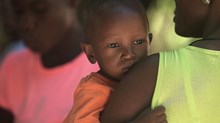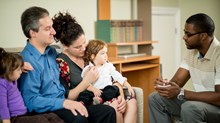Are Orphanages Really the Best Answer to the Orphan Crisis in Haiti?

In the heart of Port-au-Prince, Peterson* goes to bed after a long and busy day in the orphanage. He has eaten well, engaged in some schooling, finished a few chores, and played games with other children. He misses his mother, but it is better, he believes, than the alternative of living on the street.
This is how many of us may envision orphanages in Haiti and around the world. However, this image is a misconception for the vast majority of children.
Today, over 30,000 children are living in orphanages in Haiti, primarily due to poverty, not the loss of a parent. You see, 80% of these children have parents who are still alive. Most parents would be willing to care for their children if given support do to so, but they have been told their children would be better off in an orphanage. Promised a better life, they believe these facilities will give them food, shelter, education, and even the hope of a different future.
The grim truth is that parents are often promised lies and their children are not receiving the quality of care promised, some even experiencing abuse and neglect. Even children in the nicest orphanages with caring staff suffer the devastating consequences of living separated from family, something science has proven over the last five decades to be detrimental to the development of a child.
A truer picture is that too many children living in Haitian orphanages are the unfortunate victims of a broken system, fueled by heaps of foreign funding and support, which has turned orphanages into businesses and therefore children as commodities.
Another blow to an already-struggling country
A little over a month ago, Haiti was struck a huge blow when an earthquake left over 2,000 dead and thousands more without shelter and access to everyday needs. Already dealing with a crisis of leadership and poverty, families with children are teetering on the brink of sustainability and asking the question countless others have asked before them: Can we stay together?
This is not dissimilar to 2010, when over 20,000 children were separated from their parents because of an earthquake. While relatives and neighbors were able to care for many children, others were left destitute, dangerously roaming the streets. Aid organizations tried to reunify children and families, but the flood of international attention and donations to the poorest country in the Western hemisphere overwhelmed normal systems and processes.
Orphanages became the answer. Hundreds of miles away, well-intending American Christians generously supplied money, time, and much-needed awareness. Mission teams were deployed, and benefit concerts were planned. However, in their attempts to help children, they unintentionally contributed to the separation of children from their families. What should have been a short-term emergency response to help vulnerable children separated from their families became a permanent—and devastating—solution. The money pouring into orphanages created a dangerous situation, where children were seen as commodities.
And yet, there are glimmers of hope if we slow down enough to see them.
Stop and take a look around
Seven years ago, Mica was raped. Ostracized from her community for being an unwed mother, Mica believed that she and her unborn baby had no future together. And then she met some staff at Heartline Ministries, which focuses on keeping families together by addressing issues of maternal healthcare, economic empowerment, children’s education, and community outreach.
Only a few months later, Mica gave birth to her son. Today, Mica tears up when she thinks about the future that could have been—the one where she believed the best and only option for her son was an orphanage.
As Christians, we are impulsive to do good. We mean well. When we see a crisis on the news like that which just occurred in Haiti, we erringly believe that faster is always better. Too often, in fact, our sense of urgency leads us to make rash decisions as we hear of a church or ministry raising money to help. The problem comes in when some of these churches or ministries don’t know where the money is actually going or when the opportunity for fast funds usurps the need for long-term healing and hope for all involved.
For decades, we have taken a band-aid approach to addressing the orphan crisis in Haiti, which has further deteriorated the child welfare system. But when we stop and look around, we can find long-term solutions founded in the belief that children and families do best when they are kept together.
The not-quite $1 million question
Eight in ten orphaned children in Haiti have a living parent. Many of these families aren’t together—not due to a lack of love or desire, but due to a lack of finances. They simply can’t generate $30-90 a day to provide for their children. But what if they could?
The solution for Haiti lies in our ability to attack the poverty problem. Scripture is clear that we must give generously without a grudging heart. And yet nearly 25% of Haitians live in extreme poverty (less than $1.25/day), according to the United Nations Development Program. Additionally, 59% of Haitians live on less than $2/day.
Poverty in and of itself is not a detriment to having a loving and happy home and raising children who believe they can make our world better. When a crisis hits (or even before), our goal as generous Christians must be to invest in long-term, calculated, systemic solutions. For families facing the difficult question of “Can we stay together?,” the answer is a resounding YES, but only if we all forgo the band-aids and focus on true healing. Without the proper support systems in place such as healthcare, access to education, and economic empowerment, it becomes difficult for families to remain together. Unless we address the root causes of why children are separated in the first place, they may remain at risk within the home.
At Heartline, we’ve seen how a four-pillar model can keep families together. The solution to poverty, and thus to the orphan crisis in Haiti, starts with the ability to have happy, healthy babies (maternal healthcare). It also includes equipping and empowering parents and caregivers with the skills they need to earn money (economic empowerment) and partnering with schools for the younger generations (children’s education). Finally, it looks at the whole community (community outreach), caring for those in all places of marginalization (e.g., prisons, senior centers, children with disabilities).
Once we stop long enough to help well, children like Peterson won’t believe there is no better alternative to living in an orphanage. They will know without a shadow of a doubt that the best place is in a home defined by safety and the love of family.
*Peterson is a compilation of multiple children’s stories and hopes.
Tara Livesay and her husband Troy are executive directors of Heartline Ministries – Haiti.
The Better Samaritan is a part of CT's
Blog Forum. Support the work of CT.
Subscribe and get one year free.
The views of the blogger do not necessarily reflect those of Christianity Today.





















